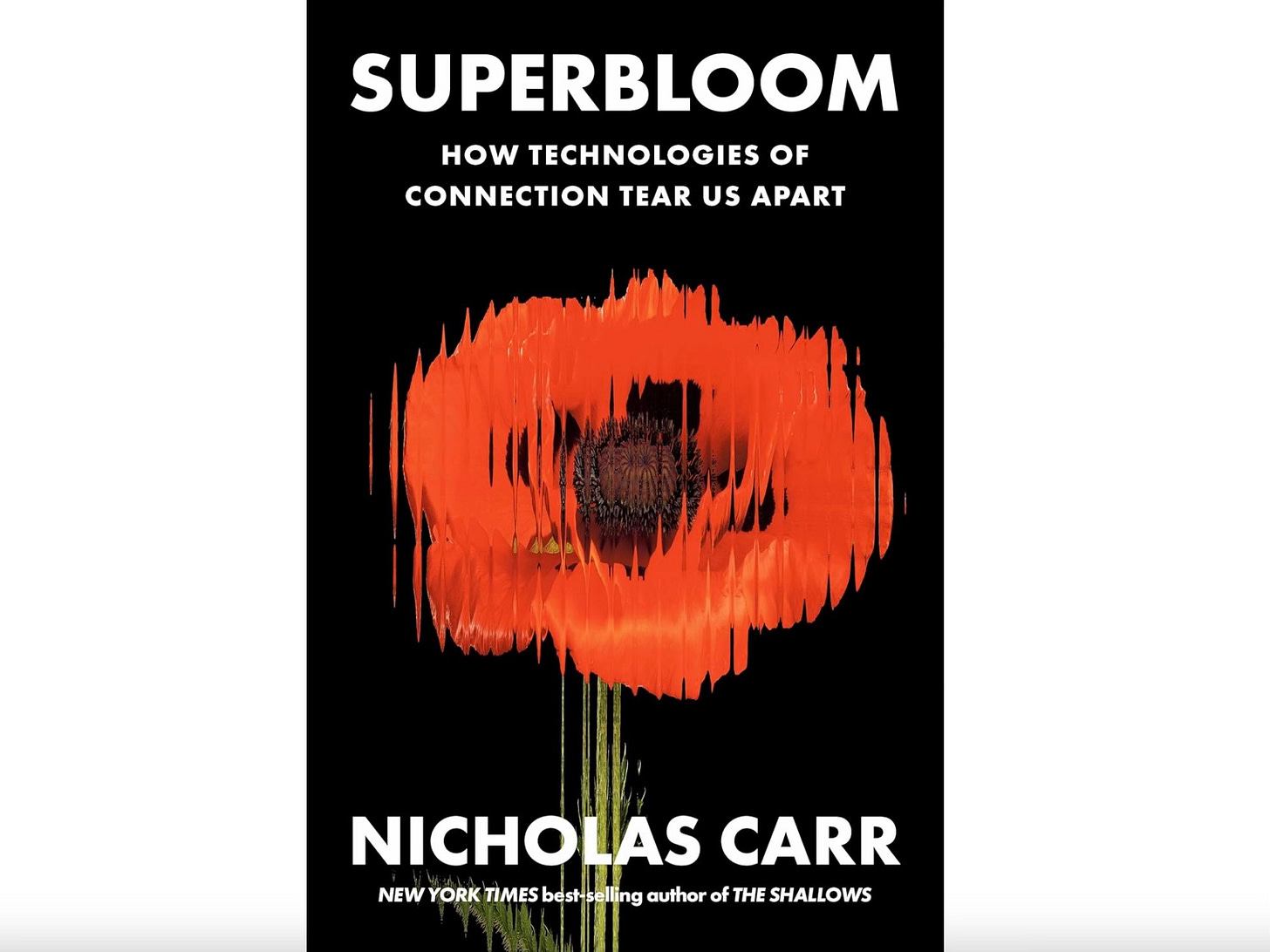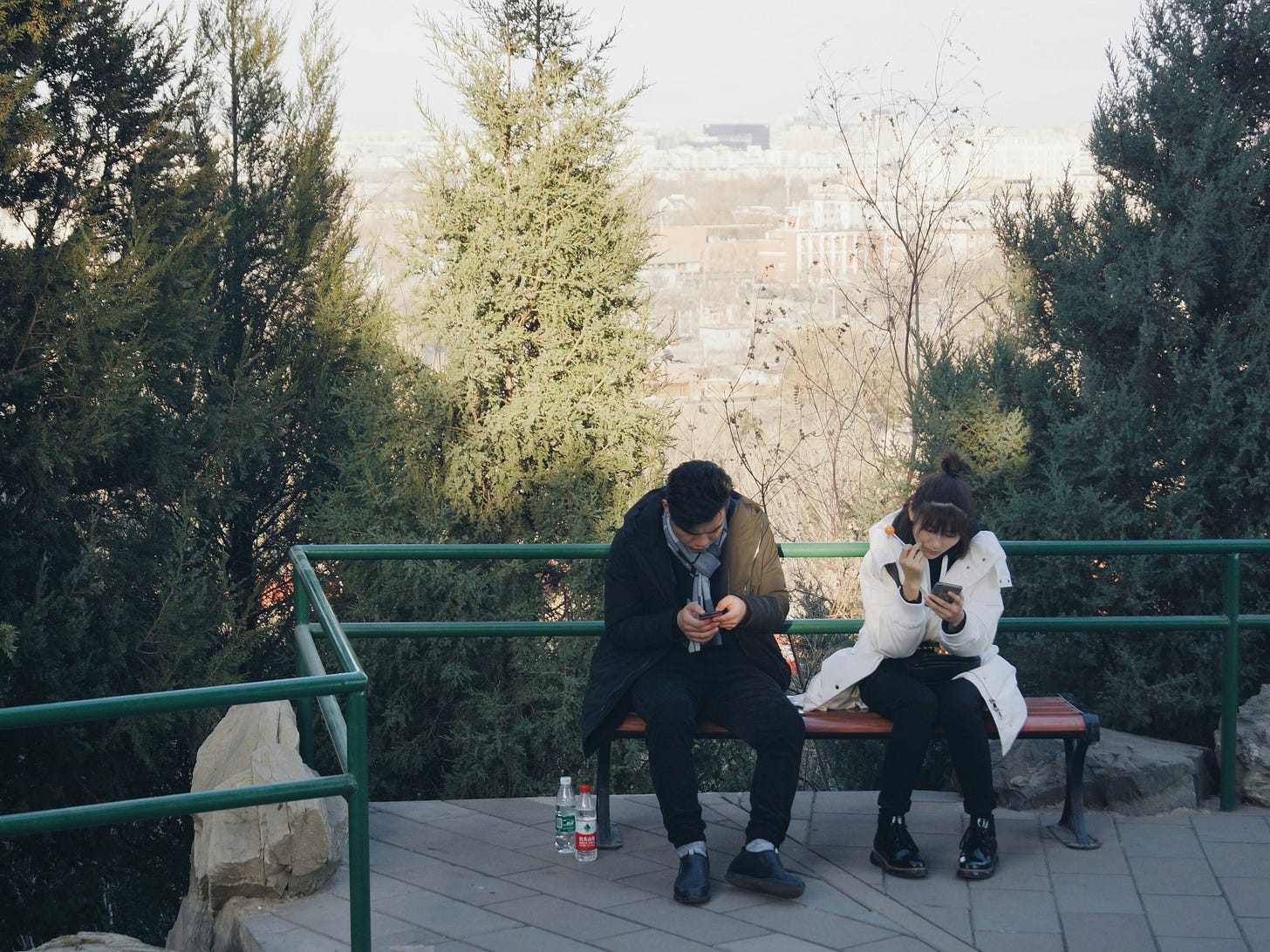'Superbloom': Tech Is Tearing Us Apart
Nicholas Carr's new book argues that incessant communication undermines comprehension.
Nicholas Carr is an American writer whose 2010 book, The Shallows: What the Internet Is Doing to Our Brains, made a big impression on me when I was researching my own book several years ago. So, when I saw he had a new book coming out in January, I made sure to buy a copy immediately. Superbloom: How Technologies of Connection Tear Us Apart aligns with Carr’s usual beat of analyzing the human consequences of technology, but I was particularly eager to see what he had to say about social media, which defines so much of our communication today.
The book provides an extensive history of communication methods, starting with the invention of writing and the transmission of information using visual signals, to the postal service, telegraphs, telephones, radio, and the rise of mass media, when everyone started listening to and watching the same TV shows, movies, news reports, and top 40 songs. Then along came personal computers, the Internet, handheld devices, social media, livestreamed videos, and now we are on the brink of AI changing everything.
The book is densely packed with research and heavier on the media theory than I expected, but it is still highly readable with lots of great historical anecdotes. A few overarching themes stood out for me.
Technophilia
One is that we humans tend always to be optimistic about new inventions (I believe “technophilic” is the right word), which I suppose makes sense, but we never seem to learn from past examples or experiences that these technologies do not stay the same and always have repercussions.
Carr writes, “New technological systems never arrive fully formed. They take years to mature technically and even longer to make their full social and cultural effects known. The more complex their workings and far-reaching their uses, the longer the maturation process takes and the likelier it is to produce surprises.” Thus, it is dangerous to assume that “the way a complex technological system works early in its development will be the way it works as it matures.”
There is an inherent long-term unpredictability to these inventions that would warrant greater caution. We can’t possibly analyze, predict, or resolve every possible issue that might arise from their use, but we can move a bit more slowly, with a bit more humility, saying, “We don’t yet know what this will do,” before incorporating them into every aspect of our lives. I’ll add, too, that we need to learn to let go of technologies that do not serve us, to become the “techno-selectionists” that Cal Newport describes.
Too Fast to Grasp
Another point Carr makes is that speeding up communication is usually assumed to be a good thing, but can cost us comprehension. In 1865, the International Telegraph Conference declared itself “a veritable Peace Congress,” suggesting that all misunderstandings that previously led to war would be eradicated by the ability to communicate swiftly through telegraph lines. Unfortunately, the opposite happened. Following the 1914 assassination of Austrian Archduke Franz Ferdinand in Sarajevo, the flurry of telegraphs between European leaders inflamed the crisis, rather than calming it.
Carr cites historian Stephen Kern: “Communication technology imparted a breakneck speed to the usually slow pace of traditional diplomacy and seemed to obviate personal diplomacy. Diplomats could not cope with the volume and speed of electronic communication.” Furthermore, telegraphs enabled military forces to mobilize much faster than they would have, had orders been sent by letter; and shortly after, World War One began.
Many of us can relate to this. We send texts or post stories or tweet reactions to things that feel justified or critical in the moment, only to wonder a few minutes later if we should have waited to calm down, think things through, or get a second opinion. In a way, it has become too easy to share our thoughts with the world.
Summarized by Harold Innis, a Canadian political economist, at the end of World War Two: “Enormous improvements in communication have made understanding more difficult.”
Our Own Fault
A third thought-provoking point in Superbloom is that Carr doesn’t shy away from calling people out for their collusion in creating and perpetuating many of the darker aspects of the Internet. He doesn’t do it in a shaming way; it’s more matter-of-fact, but still squirm-inducing:
The technology industry is a worthy target but also an easy one. In placing the blame for the internet’s failings on social media companies, we let the net itself off the hook while also absolving ourselves of complicity.
What people watch online fuels its spread. And while we may throw up our hands and protest self-righteously about why shocking videos are allowed to proliferate, the fact is that many people watch them, which makes them more visible.
Carr gives an example of a West Virginia couple that ran a YouTube channel from 2015, featuring videos of them doing cruel pranks on their young children, often making them cry. The channel was “hugely popular and generated millions of hits,” according to a report in the Guardian at the time. The parents were eventually arrested for child neglect, but the disturbing fact remains that many viewers chose this as their entertainment.
The Internet often brings out the worst in humans. Social media is not successful because it forces us to use its platforms against our will; it is successful because “it gives us what we want.” Whether we like it or not, algorithms are “adept at reading the human id and satisfying its desires, however twisted.”
Pulling Back
My sense is that Carr doesn’t have a very positive or hopeful view of our modern communication technologies. We seem unable to shake them off, let them go. We’re never not online, as the “incessant and efflorescent” flow of information surges through our subconsciousness at all times; it disrupts our focus and attention even when we’re not looking at our phones.
It's turning us into worse human beings. Social media is an “anti-empathy machine” that suppresses our ability to feel empathy for another individual, whether online or in person, by reducing opportunities to look each other in the eyes and stick with them long enough to follow how they’re feeling. It reduces self-awareness, making it harder to read human emotions, even one’s own.
And, as I’ve written before, it makes us boring. We become dull reflections of everything that we consume. Philosopher Iris Murdoch has a great (disturbing) quote: “Man is a creature who makes pictures of himself and then comes to resemble the picture.” Carr adds that we now live in a time when our conception of ourselves hinges on our ability to transmit representations through apps. “We train ourselves to see everything as potential fodder for messages.”
It feels like a sad and disappointing outcome to a grand experiment that felt very exciting at the beginning. And it looks like more tech is not the answer; less is. We need to wean ourselves off, tear ourselves away, from the devices and platforms that shape far too much of our lives right now. We need to reintroduce friction in order to make it harder to fritter away our lives on screens.
Carr suggests recalibrating our conceptions of what a good life is. “What we see today as the real world’s shortcomings—its withholding of easy and immediate amusements, its stretches of solitude and boredom, its frictions and inefficiencies—are the very things that open the world’s possibilities to us.”
We need those very things to establish relationships, to develop skills and discover hobbies, to feel more satisfied with the way we spend our time. In other words, we need to reclaim an analog life.
More Book Reviews:
A Small Reminder:
I am able to write this newsletter twice a week, thanks to generous readers who enjoy my words enough to sign up for a paid subscription! My dream is for this newsletter to become a full-time job someday.






His broad thesis is correct but hope is not altogether lost. About three weeks ago, I was sitting on the subway in London when a gaggle of schoolchildren entered my carriage. As there was a spare seat next to me, a young Indian boy about 12 years old took it and then asked me directly “how has your day been so far?” I told him it had been good and enquired of his own. He was in very positive spirits and informed me that he had enjoyed a great morning! He was returning from a school outing to Shakespeare’s Globe, upgraded on the site of the original Elizabethan theatre and retaining many features of its illustrious past. We chatted a few more minutes about his experience, what he loved most and, indeed, what he knew of Shakespeare’s plays! This delightful interlude lasted no more than five minutes as his party were changing trains but it was a reminder that kids do not automatically stare at their phones at the first opportunity. They are happily distracted by a sense of physical discovery. The real problem is adult behaviour which has normalised mobile usage and given it absurdly elevated status. One could survive quite comfortably with a dumb phone. The pace of life might change but, as the Indian boy displayed, more observation and curiosity invites us to be more human and reap the benefits.
"The Internet often brings out the worst in humans. Social media is not successful because it forces us to use its platforms against our will; it is successful because “it gives us what we want.” Whether we like it or not, algorithms are “adept at reading the human id and satisfying its desires, however twisted.”"
I think the "brings out the worst" framing is a bit wrong and the rest of your paragraph gets closer to the truth. I think the bigger problem is that we are all horrible (to greater or lesser degrees) underneath but that real-life social shaming has most of us keep it under wraps. Think of how even long ago when culture was different alcoholic, abusive husbands/dads wouldn't do it in public, instead keeping it for the privacy of home. Or consider how, when we're feeling frustrated with our children, we tend to be better parents when it happens in public than when it happens at home.
But now we've all become so atomised, spending so much time alone in our homes, that we've lost some (or all) of that social shaming conformity that, despite the warts, was actually civilizing us.
I think there is some (small) hope that the current (slow) shift from broadcast-to-the-world social media to smaller group-based chats might replicate some of the small scale tribal vibe that humans seem to require. It's not perfect because a big part of reality is that it is harder to carefully cultivate what you present to other people -- even in a group-chat of friends it is easy to elide the messy or ugly things.